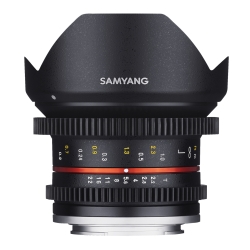
Samyang MF 12mm T2,2 Video APS-C Canon M
- Computed for APS-C sensor, for system cameras
- 12mm wide-angle lens for video and photography
- Ideal for landscape, architecture and art photography
- High speed of T2.2, stepless aperture
- Aperture ring and focus ring with gear rim for Follow Focus systems
- 12 multi-coated glass lenses, of which two are aspherical and one ED lens
- Nano Coating for extremely low reflection
- Lens pocket and protective cap and lens hood included
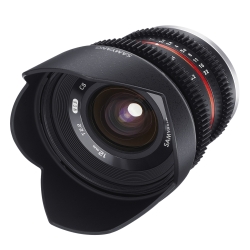
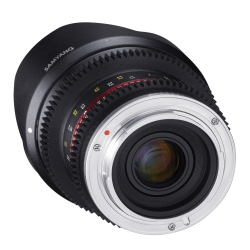
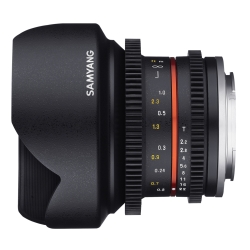
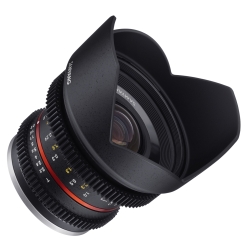













Developed for videography and photography
With the Samyang 12mm T2.2 Video APS-C you are equipped for both video and photo without having to change your lens. The aperture can be steplessly adjusted, minimizing exposure transitions. The aperture ring and focus ring are equipped with a gear rim and are therefore optimized for use with Follow Focus systems.
Ideal for landscape, architecture, art and nudes
The Samyang MF 12mm T2.2 Video APS-C is ideal for expressive landscape, architectural, art and nude photography thanks to its large viewing angle at 12mm focal length. The high luminous intensity enables a very good exposure time for optimal shots even under unfavourable lighting conditions. Focusing and aperture setting are done manually. The close-up limit is 20cm.
.
Excellent image quality thanks to multiple-coated lens surfaces and Nano Coating
For excellent imaging performance, great importance was attached to optimum lens design. All 12 glass lenses are coated with Samyang's own Ultra Multi Coating UMC, which prevents reflections and provides the image with more light. The coating also improves contrast and colour rendering. The reduction of reflections is additionally supported by a nano coating. Two of the 12 lenses are aspherical, ensuring optimum correction of spherical aberrations. In addition, one lens is made of ED glass (extra low dispersion), which also optimally corrects chromatic aberrations. The wide-angle lens is designed for system cameras and convinces with its extremely low weight and compact design. In addition, the metal housing is very sturdy.
Using an APS-C lens on a camera with full-frame sensor
Some lenses developed for cameras with APS-C sensors can also be used on cameras with full-format sensors (mainly by using an adapter). Due to the significantly smaller image circle of APS-C lenses, the sensor area outside the image circle is black. The usable area of the image photographed with a full format camera thus equals that of a camera with an APS-C sensor and is correspondingly smaller. Therefore, the images have to be trimmed during post processing. In the video field, this method requires framing in post-production. The use of APS-C lenses on full frame cameras is therefore possible, but not recommended.
Why the aperture is sometimes given in T
In photography, the abbreviation "f" is used for aperture (from "focal length"). The given value indicates the ratio between focal length and entrance pupil at the lens. In film and video, on the other hand, the abbreviation "T", which stands for "transmission", is used. This value is calculated from the aperture f and the loss of light in the individual lens. It indicates the net brightness of the image that hits the sensor. This makes it possible to change the lens when filming: As long as the same "T-Stop" is selected for both, it is guaranteed that two shots of the same scene filmed with the two different lenses are equally bright. Thus, no jumps in brightness occur when the two clips are edited together.
The Crop Factor
The focal length of a lens is always given in relation to a full-frame sensor. The full-frame sensor has the same size as a 35mm or 35mm film image. For smaller sensors in cameras, such as APS-C or MFT, a smaller portion of the image that the lens projects onto the sensor is used. This corresponds to a longer focal length. The crop factor indicates how far the focal length changes as a result. The image then shows the same section as if it had been taken by a full-frame camera at the corresponding focal length. Three common crop factors: APS-C for Nikon and Sony: 1.5 (makes a 100mm into a 150mm lens), APS-C for Canon: 1.6 (from 100mm to 160mm), MFT: 2 (from 100mm to 200mm).
General information
| Material | Aluminium, Synthetic material, Glass |
| Product Color | Black |
| Length | 59mm |
| Weight | 250g |
Specifications
| Bayonet | EF-M |
| Manufacturer | Canon |
| Developed for | APS-C |
| Suitable for Sensor | APS-C |
| Focal Distance | 12mm |
| Lens Speed | 1:2,2 |
| Internal Focusing | Yes |
| Lenses / Groups | 12 / 10 |
| Minimum Focusing Distance | 0,2m |
| Lens Diameter | 73,6mm |
| Filter Diameter | 67mm |
| Type | Wide Angle |
| Category | Wide Angle |
| Camera Model | Canon EOS M, Canon EOS M 10, Canon EOS M 2, Canon EOS M 3 |
| Field of Application Lens | Architecture, Countryside, Journey |
| Usage | Video |
| Field of Application | Art, Countryside, Nature, Travel |
Packaging
| Girth | 616mm |
| Height of Packaging | 121mm |
| Length of Packaging | 126mm |
| Packaging Material | Carton |
| Packaging with Euro Hole | No |
| Weight incl. Packaging | 300g |
| Width of Packaging | 124mm |
- 1x Samyang MF 12mm T2,2 Video APS-C lens for Canon M
- 1x Lens Hood
- 2x Lens cap (front and rear)
- 1x Lens protection bag
- 1x Manual